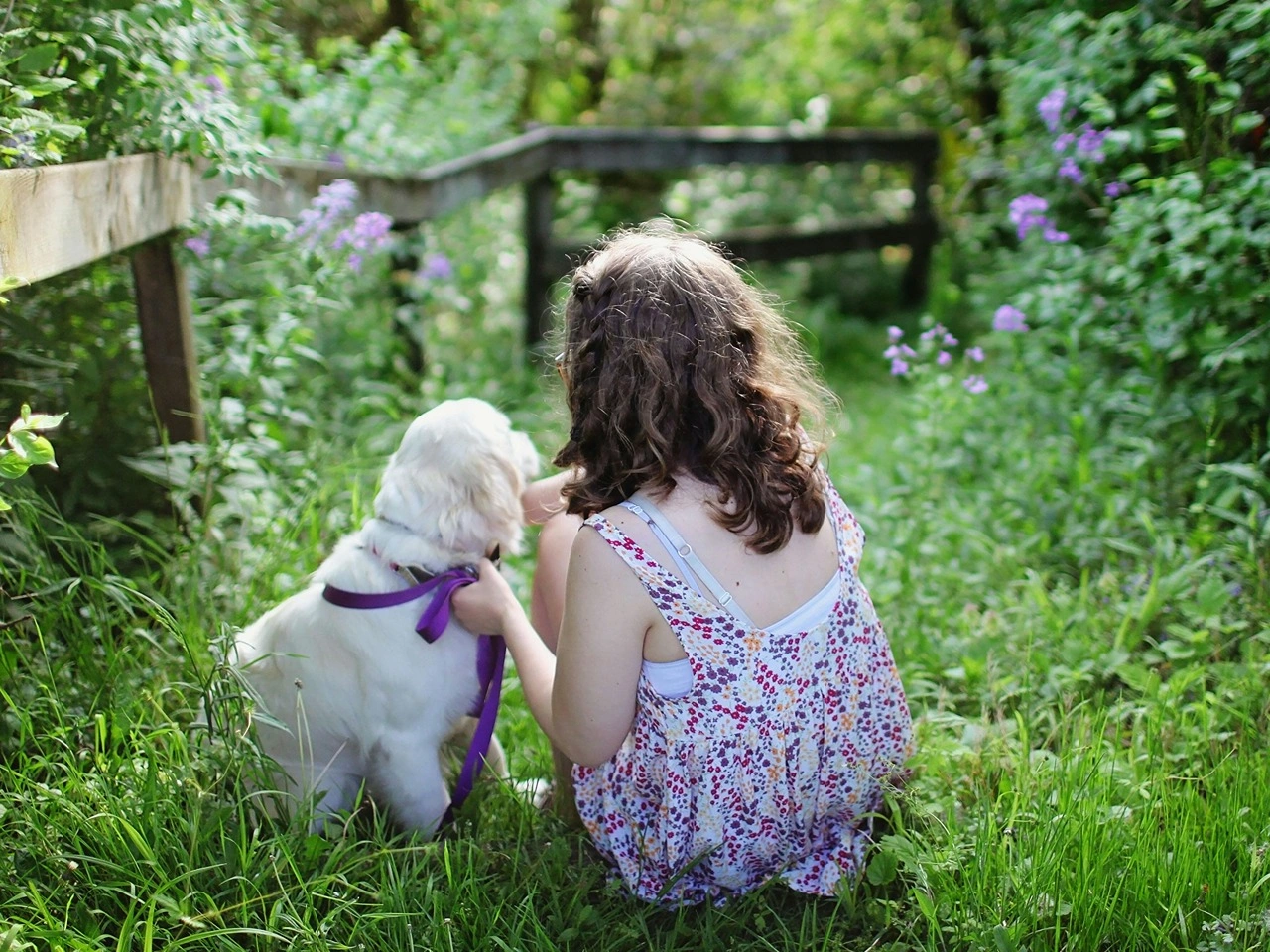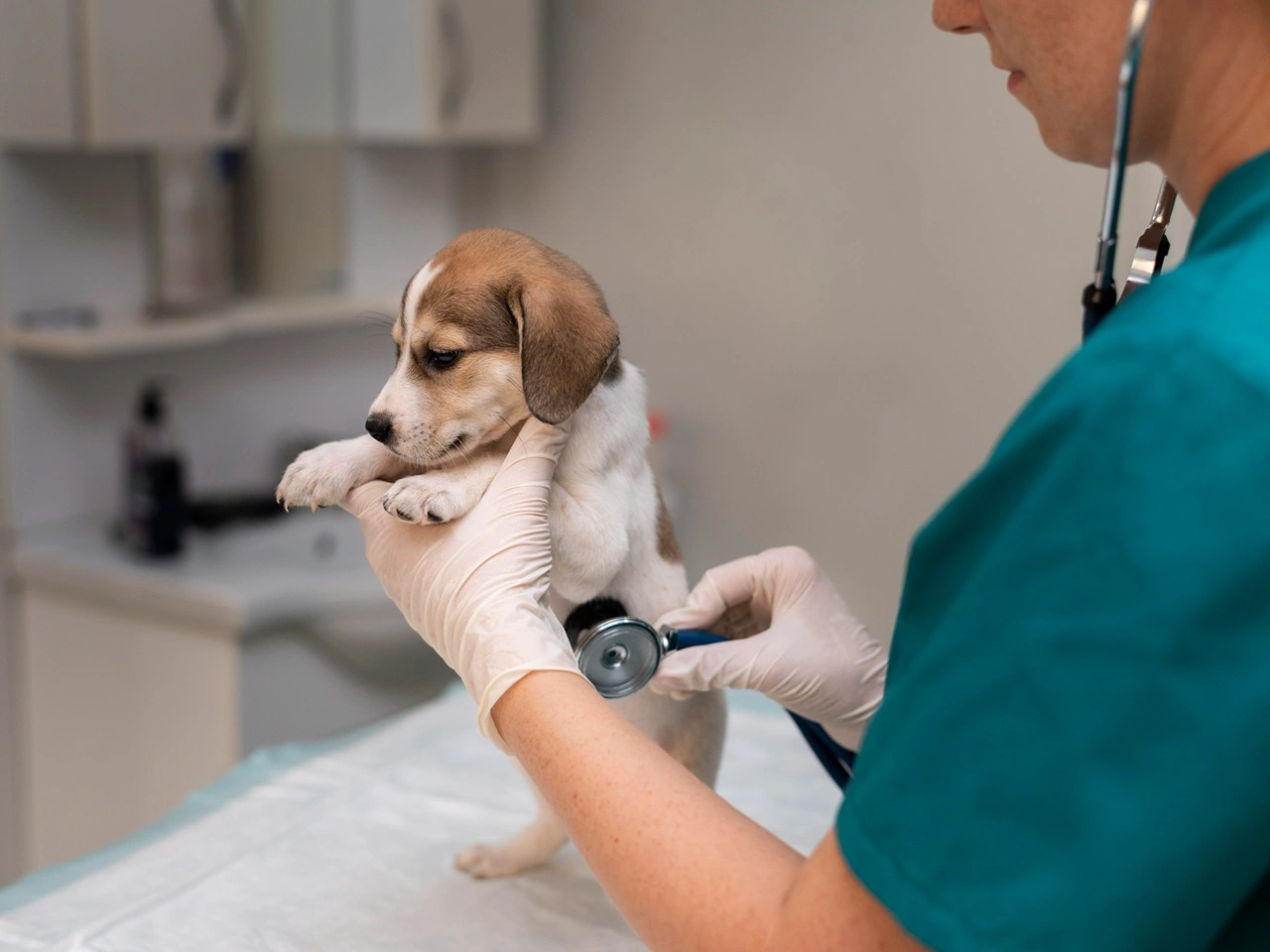TL;DR — Puppy Vaccinations: When to Get Them, Why They Matter, and What to Expect
- Puppies should begin vaccinations at 6 to 8 weeks old with boosters every 3 to 4 weeks until 16 weeks of age
- Vaccines protect against deadly diseases like parvovirus, distemper, and rabies before your puppy is exposed to other pets and environments
- Core vaccines include DHPP and rabies, while non-core vaccines like Bordetella or leptospirosis depend on lifestyle and risk factors
- Mild side effects such as soreness, sleepiness, or slight appetite changes are common and usually resolve quickly
- A booster shot is needed at one year, followed by regular adult vaccination schedules recommended by your vet
- Average cost in Canada ranges from $80 to $130 CAD per visit, depending on the clinic and vaccine type
Need help with your puppy’s vaccine plan? Contact us to book a visit and get your questions answered.
Are you getting ready to bring your puppy for its first vaccination visit? New puppies need a series of vaccinations starting at 6 to 8 weeks of age. These early shots help protect your pup from highly contagious and serious diseases.
A veterinarian will help create an appropriate vaccine schedule for your puppy based on lifestyle, age, and risk factors. Core vaccines like DHPP, rabies, and leptospirosis are usually given by 16 weeks of age. Non-core vaccines such as Bordetella and Lyme may also be recommended for added protection.
During your puppy’s first year, expect multiple visits to the veterinary clinic for initial vaccines and booster shots. Your vet will monitor your puppy’s response and adjust the schedule as needed to ensure full immunity. Understanding what to expect at each stage helps you prepare your puppy for a healthy start in life.
When Should You Vaccinate Your Puppy?

Puppies need timely vaccinations during the first year of life to build immunity and stay protected from serious and infectious diseases. Starting the puppy shots schedule at the correct age helps ensure your puppy is safe from threats like parvovirus, distemper, and rabies. An appropriate schedule for your puppy is essential, and it begins with understanding when each vaccination is given and why.
First Vaccines Are Given at 6 to 8 Weeks of Age
Most dogs and puppies receive their first essential puppy vaccinations between 6-8 weeks of age. This first visit typically includes a core vaccine such as DHP or DA2PP, which protects against multiple life-threatening viruses.
- DHP/DA2PP protects against distemper, hepatitis, parvovirus, and parainfluenza.
- The first vaccine is given during the first visit at around 6 to 8 weeks old.
- Early protection is critical before your puppy interacts with other dogs or potentially infected animals.
Booster Shots Continue Through 16 Weeks of Age
After the initial vaccine is given, your puppy needs booster shots every 3 to 4 weeks to build and maintain immunity. One of the most important of these is the rabies vaccination, which is legally required in many regions.
- Boosters are scheduled until around 16 weeks of age.
- The first rabies vaccine is given between 12 and 16 weeks, as required by law.
- Boosters ensure each vaccine protects your puppy as they grow and explore.
Schedules May Vary Based on Lifestyle and Risk
Veterinary hospitals often create an individualized vaccine schedule based on your puppy’s lifestyle and environment. Additional non-core vaccinations may be recommended if your puppy is exposed to high-risk areas.
- Puppies from animal shelters or those who visit dog parks may need extra protection.
- Non-core vaccines like Bordetella, canine parainfluenza, and Lyme disease are given based on risk.
- A veterinary care provider will help determine the vaccines your puppy needs and when each vaccination is given.
Why Vaccination Is Essential for New Puppies

New puppies are at high risk for infectious diseases during the first few months of life. Starting vaccinations early is the best way to keep your puppy healthy and protected as their immune system develops. Following an appropriate schedule for puppy vaccination ensures long-term protection and a safe introduction to the outside world.
Vaccines protect your puppy from serious infectious diseases
Puppy vaccinations are designed to prevent illnesses that are highly contagious and sometimes fatal. These include both core and non-core diseases, many of which spread easily through contact with other dogs, wildlife, or contaminated environments.
- DHPP protects against multiple viruses, also known as infectious, including distemper, parvovirus, hepatitis, and parainfluenza.
- Rabies vaccination is critical to keep your dog safe from exposure to a rabid animal and is required by law.
- Non-core vaccines such as those for Bordetella and canine parainfluenza may be given based on your puppy’s lifestyle.
Puppies need vaccines between 6 to 16 weeks of age
Vaccines are given in a specific sequence, starting when your puppy is just a few weeks old. Early protection is important because puppies are especially vulnerable between 6 to 16 weeks of age.
- Most puppies get their first vaccine at 6–8 weeks of age.
- A second vaccine is given about 3 to 4 weeks later, often at eight weeks of age or older.
- Getting your puppy started on time helps ensure full protection during their first months.
Early vaccination also protects your environment and community
Vaccinating your puppy does more than protect your own pet; it helps prevent the spread of disease to other dogs and puppies. Places like parks, shelters, or vaccine clinics can expose unvaccinated dogs to dangerous pathogens.
- Early vaccines help keep your puppy safe when socializing or visiting high-risk areas.
- Your vet may adjust the vaccine plan based on their lifestyle and potential exposure.
- Staying on schedule helps keep your dog, your home, and your community healthier.
What to Expect at Your Puppy’s First Vaccination Visit

Your puppy’s first vaccination visit is a key step in keeping them healthy and protected. This visit sets up a vaccine schedule tailored to your puppy’s lifestyle and needs.
Health Check and Physical Exam
The vet will perform a full physical exam to make sure your puppy is healthy enough for vaccines. They’ll check vital signs, weight, and overall development to ensure the immune system can respond properly.
Lifestyle and Exposure Discussion
Your vet will ask about your puppy’s daily routine and social activities. If your puppy visits public places like groomers or daycare, non-core vaccines such as Bordetella or canine parainfluenza may be recommended.
First Vaccine Administration
Once cleared, your puppy will get their first vaccine—usually around 6 to 8 weeks old—protecting against core diseases like distemper, adenovirus, and parvovirus. The injection is quick and given under the skin near the shoulder.
Observation for Reactions
After vaccination, you’ll stay briefly while your puppy is monitored for any immediate side effects. Mild tiredness or soreness is common, while serious reactions are rare and treatable.
Next Steps and Booster Schedule
Before you leave, your vet will explain when to return for booster shots and any additional vaccines. A written schedule will help you keep track and ensure your puppy stays fully protected through sixteen weeks and beyond.
How to Prepare Your Puppy for Its First Vaccination Schedule

Getting your puppy ready for their first vaccine visit helps make the experience easier and less stressful for both of you. Here’s a simple way to prepare:
- Get your puppy used to being handled
Spend some time gently touching their paws, ears, and tummy during play so vet exams feel normal. - Pick the right time for the appointment
Choose a time when your puppy is awake and playful—not right after eating or napping. - Bring something familiar
Take along their favorite blanket or toy to help them feel safe at the vet clinic. - Avoid busy dog spots before the visit
Keep your puppy away from parks, pet stores, and other places where they might catch something until they’re vaccinated. - Talk about your puppy’s routine with the vet
Be ready to share info about where your puppy lives, other pets, and any future travel plans. - Plan some downtime after the shot
Your puppy might feel sleepy or a bit sore, so give them a quiet spot to rest when you get home.
Understanding Your Puppy’s Vaccine Schedule

An appropriate schedule for puppy's vaccinations ensures your dog is protected at each critical stage of early development. Puppies are born with maternal antibodies that fade within weeks, making timely vaccines essential. Knowing when your puppy gets each shot and when boosters are due helps keep your puppy healthy and safe from common diseases.
Starting Vaccinations at 6–8 Weeks of Age
Most puppies should begin their vaccination series between 6 to 8 weeks old.
- This is when maternal antibodies begin to decline, making vaccines more effective.
- Your puppy’s immune system starts building protection from diseases like distemper and parvovirus.
- This marks the start of a vaccination timeline that will include multiple booster shots.
Core Vaccines and Their Timing
Core vaccines protect against highly contagious and potentially fatal diseases.
- At 6–8 weeks: Your puppy gets its first combination vaccine (DHPP), which covers distemper, hepatitis, parvovirus, and parainfluenza.
- At 10–12 weeks: The second vaccine in the series is given to strengthen immunity.
- At 14–16 weeks: A third dose of DHPP is typically given, along with the rabies vaccine.
- These core vaccines are essential to keep your dog protected from serious illness and are required by many local laws.
Lifestyle-Based and Non-Core Vaccines
Additional vaccines are recommended based on your puppy’s lifestyle and potential exposures.
- Bordetella and canine parainfluenza are often given if your puppy will attend daycare, grooming, or puppy classes.
- Leptospirosis and Lyme disease vaccines may be recommended if your dog goes outdoors frequently or lives in high-risk areas.
- These vaccines are usually introduced after the initial core series and follow their own booster schedules.
The Importance of Booster Shots
Booster timing ensures your puppy develops long-term immunity.
- Boosters are spaced 3–4 weeks apart to account for waning maternal antibodies.
- Final boosters at 16 weeks or later provide a strong immune foundation.
- After the initial series, boosters are given annually or every three years depending on the vaccine type and local regulations.
Following Up with Your Veterinarian
Your veterinarian or local vaccine clinics will create a custom vaccine plan tailored to your dog.
- Keep a vaccination record to track your puppy’s shots and next appointments.
- Follow your vet’s advice to maintain protection, especially before exposure to public places or other animals.
- Sticking to an appropriate schedule for puppy vaccines ensures your dog grows up healthy and protected.
Core and Non-Core Vaccines: What Your Puppy Needs

When it comes to keeping your puppy safe and healthy, vaccines play a huge role, especially in their first year of life. Some vaccines are essential for all puppies, while others depend on where they go, who they meet, and how they live.
Core Vaccines
Core vaccines are the must-haves. Every puppy needs them, no matter their breed or lifestyle.
- Distemper: A serious virus that affects your puppy’s lungs, stomach, and brain.
- Parvovirus: Causes intense vomiting and diarrhea, especially dangerous for young pups.
- Adenovirus (Hepatitis): Can lead to liver damage and eye problems.
- Rabies: Spread by a bite from a rabid animal. It’s deadly and legally required in most areas.
Non-Core Vaccines
These aren’t required for all dogs, but your vet may recommend them based on your puppy’s lifestyle.
- Bordetella and Canine Parainfluenza: Help protect against kennel cough, important if your puppy goes to dog parks, groomers, or daycare.
- Leptospirosis: A bacterial infection your puppy can catch from puddles or soil, especially in wet or rural areas.
- Lyme Disease: Passed by ticks, common in grassy or wooded places.
- Canine Influenza: Optional but helpful for social or frequently boarded dogs.
Vet Guidance
Every puppy is different. That’s why it’s best to work with your vet to build an individualized vaccine schedule.
- Your vet will consider your pup’s age, health, and daily routine
- Dogs from animal shelters may need extra protection
- If your puppy visits vaccine clinics, boarding facilities, or busy parks, they might need more than just the basics
- The second vaccine is often given around 10–12 weeks, depending on what your puppy gets at the first visit
What Happens If You Miss a Puppy Vaccination?

Missing a vaccine can affect your puppy’s protection, but your vet can help get things back on track with the right timing and plan.
Why Timing Matters
- Vaccines work best when given on a set schedule starting at 6–8 weeks of age.
- Delays may weaken your puppy’s immune response.
- Boosters are essential to protect against infectious diseases fully.
What to Do If You Miss One
- Call your vet to assess how much time has passed.
- A short delay may still allow for the next dose.
- Longer gaps might require restarting the series.
Risks of Missing Vaccines
- Increases risk of serious diseases like parvovirus or distemper.
- Can affect daycare, boarding, or travel eligibility.
- Missing the rabies vaccine may also cause legal issues if exposed to a rabid animal.
How to Get Back on Schedule
- Your vet will adjust the appropriate schedule for your puppy.
- A health check may be needed first.
- Lifestyle-based vaccines like Bordetella and canine parainfluenza may also be recommended.
Tips to Stay on Track
- Book appointments in advance and set reminders.
- Keep a record of vaccine dates.
- Ask for a schedule tailored to your puppy’s lifestyle.
Final Thoughts
Getting your puppy vaccinated on time is one of the most important things you can do to protect their health. Starting between 6 and 8 weeks of age, your puppy will need a series of core vaccines to defend against serious and infectious diseases.
Your vet will guide you through an appropriate schedule based on your puppy’s lifestyle, age, and risk level. Non-core vaccines like Bordetella and canine parainfluenza may also be added to keep your dog safe in higher-risk environments like parks or daycares.
Staying on track with booster shots helps your puppy build strong, lasting immunity. Contact us today to book your puppy’s vaccinations and get them started on the path to a happy, healthy life.
Frequently Asked Questions
How Much Do Puppy Vaccinations Cost?
Vaccinating your puppy is a must, but how much it costs can really depend on where you live and what your vet includes.
Average per visit: Expect to pay around $100 to $200 CAD per appointment.
Total for the first year: Usually between $250 and $600 CAD for the full set of shots and boosters.
Extra services: Some clinics include things like a check-up, deworming, or microchipping in the fee.
Affordable options: Check local shelters or low-cost clinics for vaccination days.
Location matters: City clinics tend to be pricier than small-town or rural vets.
What is the recommended puppy vaccination schedule during the first year?
Puppies need a few rounds of shots during their first year to build up strong protection.
6 to 8 weeks: First DA2PP shot (covers distemper, adenovirus, parvovirus, parainfluenza).
10 to 12 weeks: Second DA2PP shot and possibly Bordetella if your pup will be social.
14 to 16 weeks: Third DA2PP and their first rabies vaccine.
6 to 12 months: Boosters based on your vet’s advice.
After the first year: They’ll move on to adult vaccine schedules.
How do I know the appropriate schedule for puppy vaccination based on its needs?
Not all puppies need the exact same shots on the same timeline. Your vet will help create the right plan.
Social life: Dogs who go to parks or daycare may need extras like Bordetella.
Environment: Some areas in Canada have higher risks of things like Lyme disease or Lepto.
Health status: If your pup has any health issues, the schedule might be adjusted.
Breed and age: Some breeds or small puppies need slower or gentler schedules.
Talk to your vet: They’ll look at your puppy’s lifestyle and tailor the plan.
What is the difference between puppy vaccines and dog vaccinations for an adult dog?
The main difference is that puppy shots build up immunity, while adult dog vaccines are more about maintaining it.
Puppies: Need multiple rounds to start building strong protection.
Adults: Get occasional boosters to keep that protection going.
Fewer shots: Adult dogs may not need all the same non-core vaccines, depending on their lifestyle.
Visit frequency: Puppies go in more often, adults usually just once a year.
Purpose: It’s all about getting the immune system strong early, and keeping it that way later.
How can I prepare my puppy for booster shots and visits to the animal hospital?
Vet visits don’t have to be scary if you help your puppy feel safe and relaxed ahead of time.
Practice at home: Gently touch their paws, ears, and belly so they get used to being handled.
Bring comfort items: A favourite blanket or toy can help them feel more at ease.
Turn vet trips into positive outings: Stop by just to say hi and get a treat—no needles involved.
Get some energy out: A quick walk or play session before the visit can help calm them down.
Stay chill: If you’re calm and cheerful, your puppy will be more likely to stay relaxed too.




